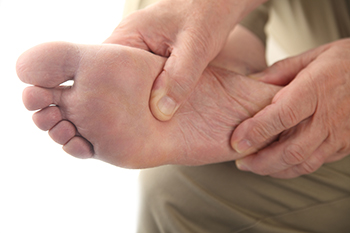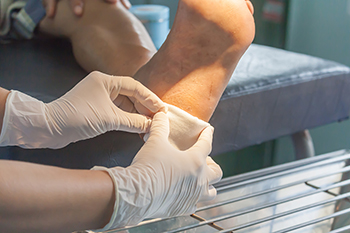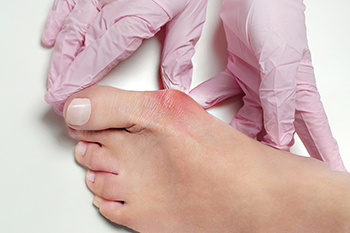

Routine foot care is important for everyone and it's especially important for diabetic patients. If an individual has diabetes, there can be accompanying nerve damage and circulation problems that can cause difficulty in feeling pain and inhibit healing. For these people who have foot problems that are left untreated, an infection may develop. It is critical for people who have diabetes to monitor their blood sugar levels daily, in addition to exercising regularly and eating healthy foods. Following a good diabetic foot care regimen is also suggested. This includes inspecting the feet for sores, redness, cuts, and blisters. It is beneficial that the feet are washed, dried, and moisturized each day, and toenails are properly trimmed weekly. Those with diabetes should not walk barefoot and it is suggested that protective and enclosed footwear are worn. If you have diabetes, it is strongly suggested that you include a podiatrist among your healthcare professionals who can examine your feet and help you to manage this condition.
Diabetic foot care is important in preventing foot ailments such as ulcers. If you are suffering from diabetes or have any other concerns about your feet, contact the podiatrists from The Foot & Ankle Center of New Jersey. Our doctors can provide the care you need to keep you pain-free and on your feet.
Diabetic Foot Care
Diabetes affects millions of people every year. The condition can damage blood vessels in many parts of the body, especially the feet. Because of this, taking care of your feet is essential if you have diabetes, and having a podiatrist help monitor your foot health is highly recommended.
The Importance of Caring for Your Feet
Patients with diabetes should have their doctor monitor their blood levels, as blood sugar levels play such a huge role in diabetic care. Monitoring these levels on a regular basis is highly advised.
It is always best to inform your healthcare professional of any concerns you may have regarding your feet, especially for diabetic patients. Early treatment and routine foot examinations are keys to maintaining proper health, especially because severe complications can arise if proper treatment is not applied.
If you have any questions please feel free to contact our office located in Paramus, NJ . We offer the newest diagnostic and treatment technologies for all your foot and ankle needs.

A chronic foot wound is a wound on the foot that does not repair itself in a normal or timely manner. Because such wounds can have serious consequences, it is important for those at risk to practice wound prevention and treatment guidelines. Wounds on the feet can include arterial, diabetic, pressure wounds and venous ulcers. When such wounds surface, it is crucial that they be assessed and even biopsied. Treating such wounds is based on the TIME principle which stands for tissue debridement, infection control, moisture balance, and edges of the wound. Once these things are evaluated, treatment is specific to the wound type. Underlying conditions, such as diabetes or vascular disease are also important to manage. If you are someone who has chronic foot wounds, it is highly suggested that you are under the care of a podiatrist, who can regularly examine your feet and immediately treat wounds that surface.
Wound care is an important part in dealing with diabetes. If you have diabetes and a foot wound or would like more information about wound care for diabetics, consult with the podiatrists from The Foot & Ankle Center of New Jersey. Our doctors will assess your condition and provide you with quality foot and ankle treatment.
What Is Wound Care?
Wound care is the practice of taking proper care of a wound. This can range from the smallest to the largest of wounds. While everyone can benefit from proper wound care, it is much more important for diabetics. Diabetics often suffer from poor blood circulation which causes wounds to heal much slower than they would in a non-diabetic.
What Is the Importance of Wound Care?
While it may not seem apparent with small ulcers on the foot, for diabetics, any size ulcer can become infected. Diabetics often also suffer from neuropathy, or nerve loss. This means they might not even feel when they have an ulcer on their foot. If the wound becomes severely infected, amputation may be necessary. Therefore, it is of the upmost importance to properly care for any and all foot wounds.
How to Care for Wounds
The best way to care for foot wounds is to prevent them. For diabetics, this means daily inspections of the feet for any signs of abnormalities or ulcers. It is also recommended to see a podiatrist several times a year for a foot inspection. If you do have an ulcer, run the wound under water to clear dirt from the wound; then apply antibiotic ointment to the wound and cover with a bandage. Bandages should be changed daily and keeping pressure off the wound is smart. It is advised to see a podiatrist, who can keep an eye on it.
If you have any questions, please feel free to contact our office located in Paramus, NJ . We offer the newest diagnostic and treatment technologies for all your foot care needs.

A bunion is a deformity that can alter the shape of the foot. Bunions are visible due to the bony lump that develops on the side of the big toe. If the bunion grows large enough, it can cause the other toes to shift toward each other, and wider shoes may have to be purchased. A bunion can develop from genetic reasons or from wearing shoes that have little room in the toe area. High heels can fall into this category and that may be a reason why women incur this condition more than men. One of the first symptoms that many patients notice is inflammation surrounding the joint of the big toe. The bunion may gradually turn red and the texture can change. Untreated bunions can affect an individual’s balance and walking and running can be compromised. Temporary relief may come from putting a protective pad over the bunion as this may help to prevent calluses from forming. If you have a bunion, it is suggested that you confer with a podiatrist who can determine what the best treatment is for you.
If you are suffering from bunion pain, contact the podiatrists of The Foot & Ankle Center of New Jersey. Our doctors can provide the care you need to keep you pain-free and on your feet.
What Is a Bunion?
Bunions are painful bony bumps that usually develop on the inside of the foot at the joint of the big toe. As the deformity increases over time, it may become painful to walk and wear shoes. Women are more likely to exacerbate existing bunions since they often wear tight, narrow shoes that shift their toes together. Bunion pain can be relieved by wearing wider shoes with enough room for the toes.
Causes
Symptoms
In order to diagnose your bunion, your podiatrist may ask about your medical history, symptoms, and general health. Your doctor might also order an x-ray to take a closer look at your feet. Nonsurgical treatment options include orthotics, padding, icing, changes in footwear, and medication. If nonsurgical treatments don’t alleviate your bunion pain, surgery may be necessary.
If you have any questions, please feel free to contact our office located in Paramus, NJ . We offer the newest diagnostic and treatment technologies for all your foot care needs.

There are a multitude of changes that happen to the body during pregnancy. These can affect the feet, and many pregnant women find relief from resting and elevating their feet at various times during the day. A common condition during pregnancy is flat feet, which causes the arch to temporarily disappear as weight is gained. An effective remedy for flat feet during this time can include wearing shoes that fit correctly, and wearing custom-made orthotics. These types of insoles may be helpful in providing the support that is needed to relieve the pain from achy feet. Hormonal changes may cause the feet to have hot or burning sensations, possibly leading to an increase in body temperature. The majority of foot conditions during pregnancy may be managed by drinking plenty of water daily, keeping physically active, and wearing seamless socks, which may help poor circulation. It is suggested that women who have foot pain during pregnancy speak to a podiatrist who can offer effective relief remedies.
Pregnant women with swollen feet can be treated with a variety of different methods that are readily available. For more information about other cures for swollen feet during pregnancy, consult with the podiatrists from The Foot & Ankle Center of New Jersey. Our doctors will attend to all of your foot and ankle needs.
What Foot Problems Can Arise During Pregnancy?
One problem that can occur is overpronation, which occurs when the arch of the foot flattens and tends to roll inward. This can cause pain and discomfort in your heels while you’re walking or even just standing up, trying to support your baby.
Another problem is edema, or swelling in the extremities. This often affects the feet during pregnancy but tends to occur in the later stages.
How Can I Keep My Feet Healthy During Pregnancy?
If you have any questions please feel free to contact our office located in Paramus, NJ . We offer the newest diagnostic and treatment technologies for all your foot and ankle needs.